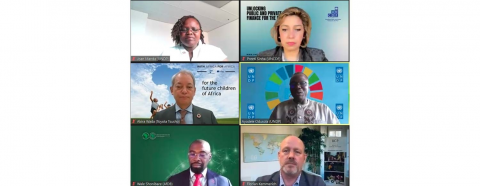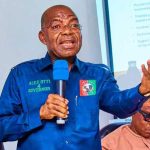External Shocks Have Increased Africa’s Annual SDG Financing Gap To $353bn – UNDP
African News, Business News, Latest Headlines Tuesday, September 27th, 2022
(AFRICAN EXAMINER) – The United Nations Development Programme (UNDP), has said that the annual Sustainable Development Goal (SDG) financing gap in Africa has increased to $353 billion due to unexpected external shocks, such as the COVID-19 pandemic.
This was disclosed by the UNDP Deputy Assistant Administrator and Officer-in-Charge, Regional Bureau for Arab States, Sarah Poole.
Poole, who spoke at a side event of recently concluded Eighth Tokyo International Conference on African Development (TICAD8), explained how development partners like UNDP can support creating the enabling conditions for directing financing flows towards proven SDG-aligned investment opportunities.
The event with the themes “Africa Continental Investor Convening: Partnering for SDG Investments in the Green & Blue Economy in Pursuit of Agenda 2063”, was jointly organized by UNDP and the African Development Bank (AfDB).
The virtual event brought together the private and public sector, attracting some 300 participants, to discuss investment opportunities in the green and blue economies with the potential to drive inclusive growth and contribute to the achievement of the SDGs on the African continent.
TICAD8 culminated in the announcement of Japan’s $4 billion Green Growth Initiative with Africa, and $70 million Investment Fund for Startups.
She said together with governments and partners, UNDP developed SDG Investor Maps, which, according her, “have enabled us to guide investors’ decision-making towards the SDGs and direct capital to where it is most needed, as part of the broader integration of public and private as well as domestic and international financing streams”.
Also at the event, national investment promotion agencies from Djibouti, Mauritius and Nigeria presented investment opportunities from their respective SDG Investor Maps.
Chief Executive Officer (CEO) of the Economic Development Board of Mauritius, Ken Poonoosamy highlighted his country’s positive economic outlook and discussed the Decentralized Water Treatment and Supply Systems investment opportunity and its Energies des Mascareignes project, which aims to achieve a zero-waste tuna industry.
Similarly, the Director of the Department of Policy Advocacy of the Nigerian Investment Promotion Commission (NIPC), John Oseji spoke about the Deep Sea Ports and presented the investment study project from Ondo State, which is capable of supporting modern shipping vessels.
In his remarks, the Director of Investments of the National Investment Promotion Agency, Rahma Omar Kamil discussed Djibouti’s significant wind energy potential, pointing out the Large-Scale Wind Power Generation investment opportunity.
The country spotlights were followed by a dynamic panel discussion on how the Japanese private sector can realise African investment opportunities, and what support public institutions can provide to accelerate investments in Africa’s green and blue economies.
Akira Wada, from Toyota Tsusho Corporation, said Japanese investors are committed to investing in Africa as a new frontier, especially around renewable energy opportunities.
Florian Kemmerich from Bamboo Capital Partners confirmed the dynamic nature of African markets. “Our investment focus lies on the so-called ‘missing-middle’ to fund, via loans and equity, rural SMEs, early-stage companies, but also financial institutions in order for them to localise funding themselves”,
The UN Capital Development Fund, represented by Executive Director Preeti Sinha, highlighted how development partners can catalyze private capital in the green and blue economy.
Speaking further, she said: “For example, in The Gambia, the UN Capital Development Fund built on the project sourcing by UNDP to provide financial structuring and administration of a $9 million guarantee from the Multi-Donor Trust Fund for a solar power project, which resulted in a $15 million private investment thanks to the de-risking support”.
Wale Shonibare, Director for Energy Financial Solutions for Policy and Regulation at the AfDB, Wale Shonibare said: “Private sector opportunities, like those captured in the SDG Investor Maps, will enable regional integration and drive Africa’s economies in the future whereby the African Continental Free Trade Area (AfCFTA) serves as a unique enabler.
“Development finance institutions like the African Development Bank can work with governments and the private sector to create synergies for maximum impact, for example through initiatives like the Sustainable Energy Fund for Africa (SEFA) and the Africa Guarantee Fund, promoting private investments in energy-efficient technologies and business models, with the objective of decarbonising African economies and accelerating the continent’s energy transition”.
As the panel moderator, Dr Ayodele Odusola, Director of the UNDP Africa Sustainable Finance Hub and Resident Representative of UNDP South Africa noted that the time is ripe for the public-private collaboration presented in the context of TICAD 8.
“More than ever, we are seeing a multitude of investment opportunities for the Japanese private sector in African markets, which is key to the transformative development of the continent and achieving the African Union (AU) Agenda 2063”, he further explained.
Related Posts
Short URL: https://www.africanexaminer.com/?p=81384






















